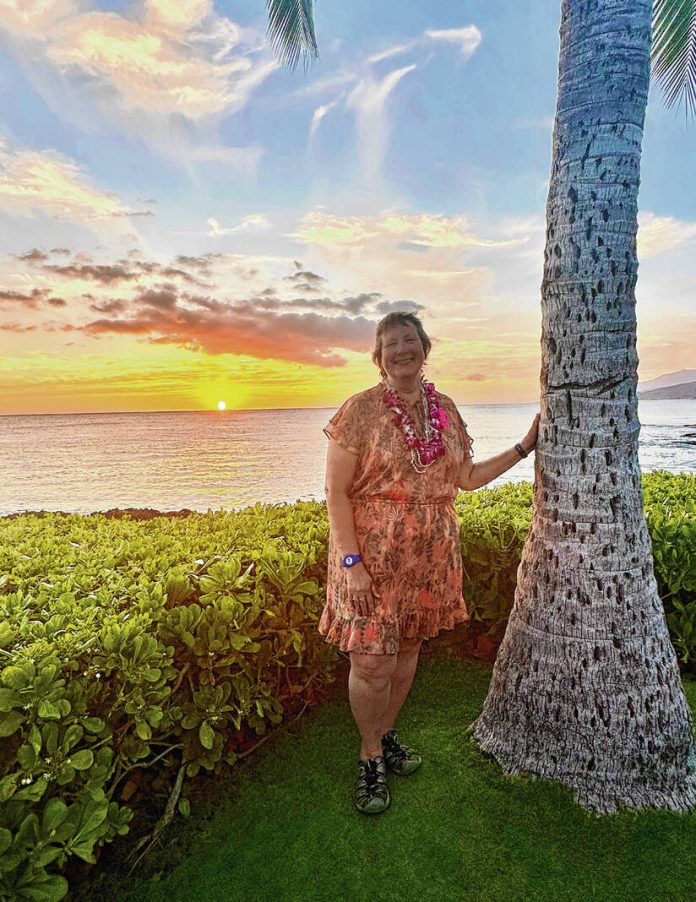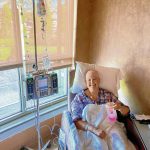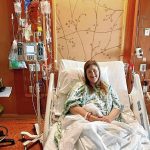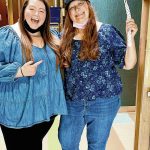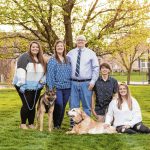There had to be an error.
The doctor thought so, as did the entire medical staff. After Patty Davis’ annual Pap test had come back with traces of cancer cells, she started a month of uncertainty. She had a cervical biopsy done, which came back negative.
Her medical team thought her specimen had been contaminated, as the type of cancer cells discovered were incredibly rare to show up on a Pap test, and ordered the lab to rerun them. The results were the same. A subsequent ultrasound of her uterus and ovaries gave no indication of cancer, either.
“I continued with my life during that month believing there had been a mistake and I was fine,” she said.
But in the push for answers, Davis confirmed what she had been trying to deny — she had Stage 3 metastatic ovarian cancer.
“I was pretty fatalistic. You hear cancer, and you think you’re just going to die,” she said.
What followed was surgery to remove her uterus and ovaries, as well as part of her colon and other organs. The Center Grove-area resident went through chemotherapy that caused terrible nausea and vomiting, which left her sick for most of the summer of 2022.
Having completed the treatment, the months of difficulty, pain and disruption seem far away. Going through cancer has changed her whole mindset.
“I can’t believe I’m where I’m at today. When I was in the throes of it, I would tell (her daughter) that I didn’t think I would ever be normal again. I was so weak, I did nothing at the house,” she said.
For all of the time Davis spent stuck in bed during her cancer ordeal, she’s made up for it in the past year. She’s been on four cruises, heading to places such as Hawaii, the Dominican Republic, Turks and Cacaos and the Bahamas. Her next big trip is to Alaska.
Very quickly, she’s checked off some big bucket list items.
“I told my husband, I don’t know how many days I have left in this world. I want to go, let’s go. What else am I waiting for?” she said.
The experience has taught her that life can change suddenly; you need to take advantage of your opportunities while you can.
“My new motto is, ‘Travel, travel, travel — to do what I’ve put off forever,’” she said. “If someone says let’s go on a weekend trip, or let’s do this, I’m going.”
Leading up to her diagnosis, Davis gave no indication she was sick at all. She had no symptoms of ovarian cancer whatsoever.
But when her yearly Pap test indicated cancer in December of 2021, it started a chain reaction that forever altered her life.
Despite the initial assumption that her test results had been contaminated, Davis’ doctors kept searching for a definitive answer. Scans repeatedly failed to show where the cancer was, but cancer cells kept turning up in her test results.
“There was a CT scan where they said there was cloudiness in my abdomen, but they couldn’t really see anything,” she said.
In particular, her gynecologist gave her a blood test to look for CA125, a protein produced by the body in response to cancer. The presence of it is often used to detect ovarian cancer.
Tests showed her CA125 levels to be 369. Anything over 30 is considered to mean cancer was present.
Patty Davis gets chemotherapy at Franciscan Health Indianapolis’ infusion clinic in the summer of 2022 after being diagnosed with ovarian cancer.
SUBMITTED PHOTO
Patty Davis is hospitalized at Franciscan Health Indianapolis in the summer of 2022 after receiving chemotherapy treatment when she was diagnosed with ovarian cancer.
SUBMITTED PHOTO
Patty Davis, right, rings the bell after her final round of chemotherapy at Franciscan Health Indianapolis in 2022 after being diagnosed with ovarian cancer. Her daughter, Emily Davis, was there to support her. Davis, a Center Grove-area resident, went through a hysterectomy and six rounds of chemotherapy to treat the disease. She’s now cancer-free.
SUBMITTED PHOTO
Patty Davis, center, and her family in the spring of 2022 after she went through surgery to treat ovarian cancer.
SUBMITTED PHOTO
Patty Davis poses in front of a stunning sunset in Hawaii, where she traveled after completing her treatment for ovarian cancer.
SUBMITTED PHOTO
Davis was referred to a gynecologic oncologist at Franciscan Health Indianapolis, who scheduled her for an exploratory surgery in February of 2022. The surgery was set for a Friday, so Davis told her co-workers at Franciscan Health she’d be back to work on Monday. She had no idea it would be eight more months before she’d return.
During surgery, her doctor immediately identified Stage 3 metastatic ovarian cancer.
“I was in total disbelief for days,” Davis said. “I did a lot of crying and was really unable to process what I had been told.”
The next days were a blur. She was scheduled for massive surgery — a full hysterectomy, plus the removal of one foot of her colon and her appendix, which both showed signs of cancerous growths. She went through rounds of bloodwork, met with a cardiologist to ensure her body could withstand such an intensive surgery.
Because they’d be removing part of her colon, Davis met with specialists about the placement of an ostomy bag she might need to wear.
“That was my biggest concern coming out of surgery — if I’d need an ostomy bag. After all of everything, I didn’t want to deal with that,” she said. “But they were able to make sure I didn’t need one, so that was good.”
The surgery lasted almost eight hours, and Davis faced a long recovery from the operation. She woke up with an incision running from her sternum down to her pubic bone. She couldn’t get out of bed without help from her daughter, Emily Davis, who is an oncology nurse and offered the right balance of compassion and push to help her recover.
“I went into nurse mode. I didn’t really process the whole situation myself either, because I had to be that support for her,” Emily Davis said. “My big thing was to just be positive. The more positive you are, the more you’re going to want to get up and try to walk, you’re going to get up and try to drink something.”
Davis spent six weeks recovering from surgery, staying a strict liquid diet for half that time as her colon healed. As her strength returned, she met with her oncologist to discuss the next mountain in her treatment — chemotherapy. A port was implanted in her stomach to directly pump powerful chemotherapy directly into her abdomen.
Her oncologist recommended six rounds of inpatient chemotherapy, spread out every three weeks, if she could withstand it.
“She told me going in that the belly chemo was the hard one. She said some people go all six rounds, some people only go one round,” Davis said. “I really struggled.”
Still, Davis was able to go through three rounds of the treatment before she had to stop; she was suffering from dehydration, low blood counts and felt incredibly weak. A cardiac oncologist had to be called in as her heart rate was dangerously low.
She was hospitalized for three days before she recovered.
“I told them I didn’t know if I could do another one. I was getting weaker and weaker, to the point where I couldn’t even walk into the doctor’s office,” she said.
Davis points to her daughter for helping her get through the worst of it all.
“I would try to force-feed her, force her to drink. She was so nauseous, being on two or three nausea meds, and she’d still be throwing up,” Emily Davis said.
When Davis started losing her hair from the chemotherapy, she made the difficult decision to just shave her head. She asked Emily to come out on the family home’s front porch and shave it off with some barber’s clippers.
As the hair came off, Emily Davis commented on a large mole she had on the top of her head. Both she and Davis’ husband thought it looked concerning.
“I was in the middle of chemo and didn’t feel very good, but I called my dermatologist. They took a biopsy, and it was melanoma. I had no idea it was there, but I wouldn’t have known if I didn’t lose my hair,” she said. “So they cut it all out.”
Davis finished her treatment with three rounds of a slightly more mild chemotherapy through her chest port. She finished her final one in August of 2022, and she was declared to be cancer-free.
Doctors continued to monitor her blood levels, searching for signs of the CA125 protein. Once those levels were below 11, her medical team started her on a drug called Rubraca. The chemotherapy drug is designed to keep her in remission, though she can only take it for two years, as it can lead to leukemia.
She still has regular appointments with her doctors, who track her CA125 levels. Each visit is beset with worry.
“I get very anxious when I get my blood work. They’re always watching that marker; there really isn’t any signs, unless you have symptoms,” she said. “I have a really hard time trusting my body to know if it’s back, because I didn’t know it was there in the first place.”
Davis has gone back to work at Franciscan Health Indianapolis, and has set her focus on traveling as much as possible. While the experience with cancer would have best been avoided, she has used it to transform her approach to life.
“I am grateful for every day. It’s my new motto,” she said.
Patty Davis
Age: 58
Diagnosis: Stage 3 metastatic ovarian cancer
Treatment: Hysterectomy and removal of a portion of her colon; six rounds of chemotherapy, plus ongoing two years of a chemotherapy pill.
How has cancer changed you?
“I am grateful for every day. It’s my new motto. I’m grateful that I’m alive. I have such an appreciation of the time I have now.”
What did cancer teach you?
“You have to have a good support system. You can’t do it alone. I don’t know how people do it by themselves.”
What would you say to someone who has cancer?
“I don’t know if I had a strategy. I just tried to survive each day. I didn’t want to do it anymore.”


